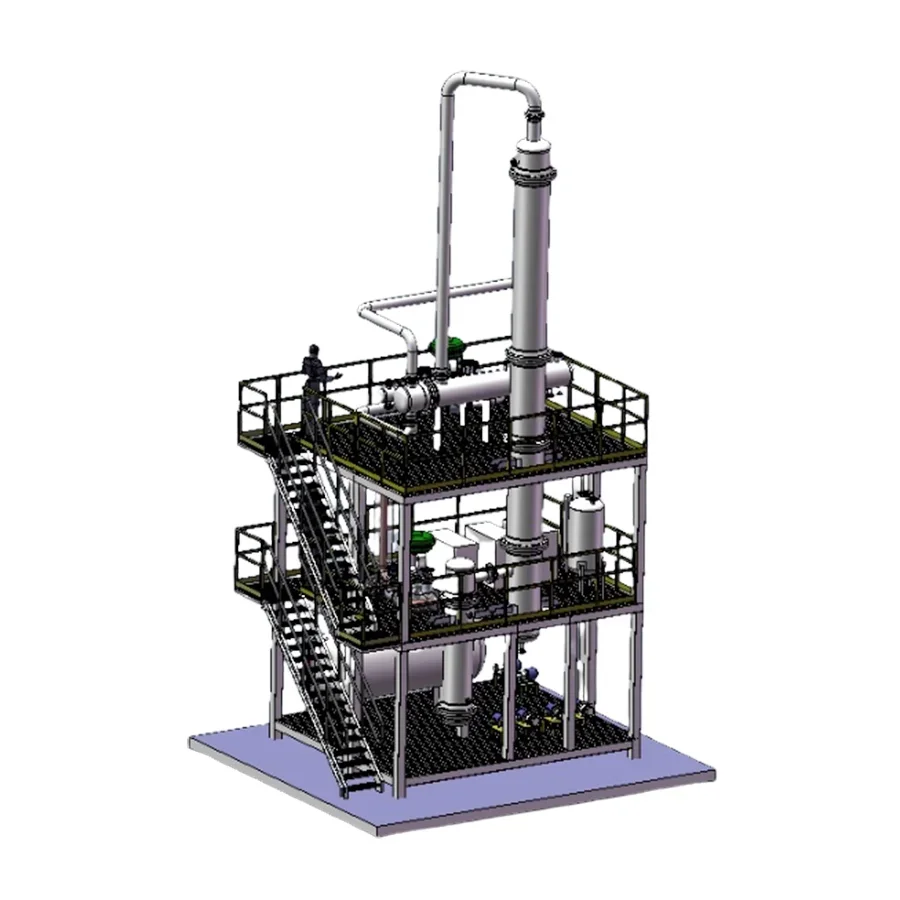Separation engineering units play a crucial role in various industrial processes, enabling the efficient separation of components from mixtures. Shanghai Chem-Unit Technologies Co., Ltd. specializes in the design and manufacture of modular testing devices, pilot plants, and production units that incorporate advanced separation technologies. This article will explore the applications and advantages of separation engineering units, highlighting their significance in enhancing operational efficiency and product quality across multiple industries.
Understanding Separation Engineering Units
Separation engineering units are designed to perform physical or chemical processes that separate different components within a mixture. These processes can include distillation, absorption, extraction, filtration, and crystallization. Each unit is tailored to meet specific operational needs and can be integrated into larger production systems.
Key Components of Separation Engineering Units
Distillation Columns: Used to separate mixtures based on differences in boiling points. Distillation is commonly employed in the petrochemical industry for refining crude oil into gasoline and other products.
Absorption Towers: These units capture specific components from gas mixtures by passing them through a liquid absorbent. They are widely used in air pollution control to remove harmful gases.
Membrane Separators: Utilizing selective permeability, membrane technology separates molecules based on size or chemical properties. This method is increasingly popular in water treatment processes.
Crystallizers: Employed to produce solid crystals from a solution, crystallization is essential in industries such as pharmaceuticals for purifying compounds.

Applications of Separation Engineering Units
Separation engineering units find applications across various sectors:
1. Chemical Industry
In the chemical industry, separation processes are fundamental for producing high-purity chemicals. Distillation columns and absorption towers are commonly used to separate raw materials from by-products, ensuring that the final products meet stringent quality standards.
Example: In the production of ethanol, distillation is utilized to separate ethanol from water and other impurities, yielding high-purity alcohol for use in beverages and industrial applications.
2. Food and Beverage Industry
The food industry relies on separation technologies to enhance product quality and safety. Techniques such as filtration and centrifugation are employed to clarify juices, remove impurities from oils, and concentrate flavors.
Example: The use of membrane filtration in dairy processing helps separate whey from milk solids, producing high-quality cheese while minimizing waste.
3. Pharmaceutical Industry
Separation engineering units are critical in pharmaceutical manufacturing for purifying active ingredients and ensuring compliance with regulatory standards.
Example: Crystallization techniques are used to isolate active pharmaceutical ingredients (APIs) from reaction mixtures, ensuring that the final product is free from contaminants.
4. Environmental Engineering
In environmental applications, separation technologies play a vital role in treating wastewater and controlling air pollution. Advanced separation units are designed to remove hazardous substances from effluents before they are discharged into the environment.
Example: Activated carbon adsorption systems are employed to remove volatile organic compounds (VOCs) from industrial emissions, helping companies comply with environmental regulations.
Advantages of Separation Engineering Units
The implementation of separation engineering units offers numerous benefits:
1. Enhanced Efficiency
Separation engineering units optimize industrial processes by increasing throughput and reducing downtime. By efficiently separating components, these units minimize the need for additional processing steps.
Benefit: Higher efficiency translates into lower operational costs and increased productivity.
2. Improved Product Quality
By ensuring the effective separation of impurities and by-products, these units enhance the quality of final products. High-purity outputs are essential for meeting industry standards and consumer expectations.
Benefit: Improved product quality leads to higher customer satisfaction and reduced returns or recalls.
3. Flexibility and Modularity
Many separation engineering units are designed as modular systems that can be easily integrated into existing production lines or scaled up as needed. This flexibility allows companies to adapt to changing market demands without significant capital investment.
Benefit: Modular systems enable businesses to respond quickly to new opportunities or regulatory requirements.

Challenges in Implementing Separation Engineering Units
While separation engineering units offer significant advantages, there are challenges associated with their implementation:
1. Initial Investment Costs
The upfront costs of acquiring advanced separation equipment can be substantial. Companies must weigh these costs against potential long-term savings and efficiency gains.
2. Technical Expertise Requirements
Operating advanced separation technologies requires skilled personnel who understand the underlying principles of separation processes. Ongoing training and development are essential for maintaining operational effectiveness.
3. Maintenance Needs
Regular maintenance is crucial for ensuring optimal performance of separation units. Companies must invest time and resources into maintaining equipment to prevent downtime due to malfunctions or inefficiencies.
Future Trends in Separation Engineering
As industries continue to evolve, several trends are shaping the future of separation engineering:
1. Increased Automation
Automation technologies are being integrated into separation processes to enhance efficiency and reduce human error. Automated monitoring systems can provide real-time data on performance metrics, allowing for timely adjustments as needed.
2. Advanced Materials
Research into new materials for membranes, adsorbents, and catalysts is driving innovation in separation technologies. These advancements can lead to more efficient processes with improved selectivity and lower energy consumption.
3. Sustainability Focus
As environmental concerns grow, there is an increasing emphasis on developing sustainable separation processes that minimize waste generation and energy use while maximizing resource recovery.

Conclusion
Separation engineering units play an essential role in enhancing industrial processes across various sectors, including chemicals, food production, pharmaceuticals, and environmental management. By providing efficient methods for separating components from mixtures, these units contribute significantly to product quality and operational efficiency.
Shanghai Chem-Unit Technologies Co., Ltd., with its expertise in designing modular testing devices and production systems, is well-positioned to meet the growing demand for advanced separation technologies. As industries continue to seek innovative solutions that prioritize efficiency and sustainability, the importance of effective separation engineering will only increase in the years ahead.
Investing in state-of-the-art separation engineering units not only enhances productivity but also supports compliance with regulatory standards while promoting sustainable practices—ultimately leading to a more efficient industrial landscape that benefits both businesses and consumers alike.
The Importance of Quality Separation Engineering Units in Industrial Operations



